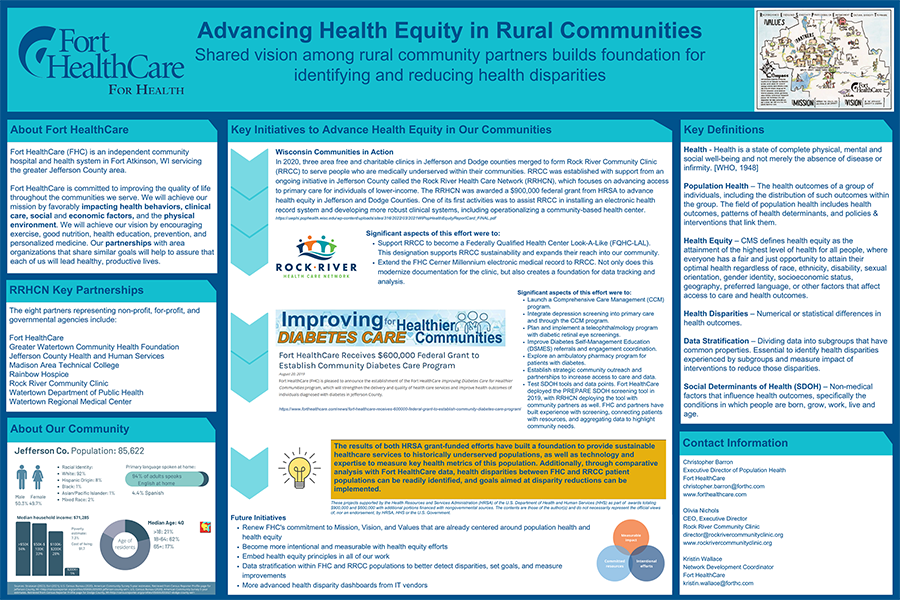Advancing Health Equity in Rural Communities
Fort HealthCare’s project, Advancing Health Equity in Rural Communities, describes how a shared vision among rural community partners has built a foundation for identifying and reducing health disparities. This shared vision brought together eight partners representing non-profit, for-profit, and governmental agencies to form the Rock River Health Care Network (RRHCN). The eight partners were Fort HealthCare (FHC), Greater Watertown Community Health Foundation, Jefferson County Health and Human Services, Madison Area Technical College, Rainbow Hospice, Rock River Community Clinic (RRCC), Watertown Department of Public Health and Watertown Regional Medical Center.
The focus of RRHCN is to advance access to primary care for lower-income individuals. Through support from a federal Health Resources and Services Administration (HRSA) grant, existing charity health and dental care organizations consolidated into a single entity (RRCC) with the goal of earning Federally Qualified Health Center Look-A-Like (FQHC-LAL) designation that was awarded December 2022. FQHC-LAL designation supports RRCC sustainability and allows RRCC greater reach into the community.
Fort HealthCare was able to extend their Cerner electronic health record to RRCC which allows RRCC all the benefits of an advanced electronic medical record, including advanced population health management analytics with the Cerner HealtheIntent platform. Fort HealthCare has worked with RRCC to replicate the FHC internal population health management governance and analytics at RRCC. Not only does this support improvement efforts at RRCC, but Fort HealthCare can now measure health disparities between the FHC and RRCC populations, and work together to set improvement goals focused on reducing health disparities. This work is evolving into a disparity tracking scorecard between FHC and RRCC and will likely form the basis for internally stratified disparity tracking.
A tactic to identify root causes of health disparities is to screen for social determinants of health (SDOH), using information from SDOH screenings to both connect patients with resources and inform at a population level of community needs. In 2019, Fort HealthCare was awarded another federal HRSA grant focused on improving diabetes care in the community. One of the key elements of the Improving Diabetes Care for Healthier Communities project was to deploy the PRAPARE SDOH screening tool. The PRAPARE tool has been deployed internally at FHC as well as with several RRHCN partners (Rainbow Hospice and RRCC).
Fort HealthCare is thankful for the many partners that have shared the vision to be the healthiest community in Wisconsin. It is truly a community effort.
